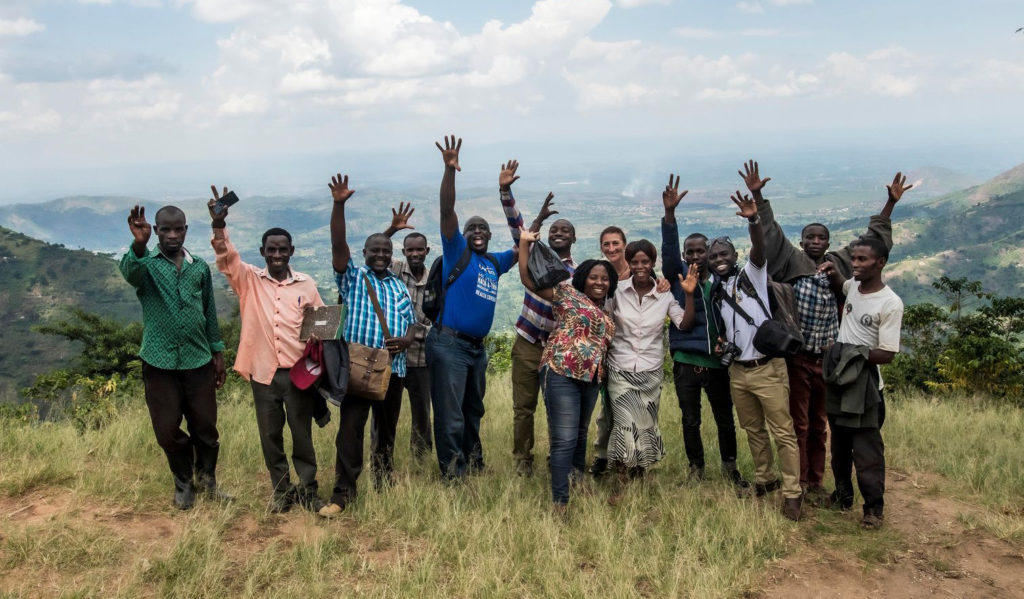As an oncologist in Zambia, Paul Chilwesa, MD, believed that a diagnosis of metastatic cancer was the equivalent of a death sentence for most patients. But this spring, Dr. Chilwesa, who specializes in cervical cancer, traveled from Africa to the Massachusetts General Hospital Cancer Center to take part in an innovative training and exchange program. There, he met someone who changed his mind — a patient who had lived more than 10 years after being diagnosed with metastatic kidney cancer.
“This program provides an opportunity to share a practical vision of what cancer care can be, even in limited resource settings.”
“I had never seen anything like it.” Dr. Chilwesa says. “In Africa, most people believe nothing can be done to treat cancer, but this patient was proof that a diagnosis is not death.”
Launched in 2018 by Mass General and Beth Israel Deaconess Medical Center, the Program for Enhanced Training in Cancer (POETIC) brings promising young African oncologists to Boston for three weeks of specialized training in their areas of interest. Participants shadow medical, radiation and surgical oncology teams and take part in daily meetings and discussions. They also attend training sessions on topics ranging from basic pharmacology and radiation oncology techniques to how to write clinical trials and fee structure.
“To be truly effective as a cancer center, we need to be attuned to the needs of the cancer community beyond our city limits,” says Aparna Parikh, MD, of the Mass General Cancer Center and co-director of POETIC. “This program provides an opportunity to share a practical vision of what cancer care can be, even in limited resource settings.”

Africa’s Need for Cancer Care
The seed for the program was planted in 2016, when Dr. Parikh and fellow co-founder Bruce Chabner, MD, clinical director, emeritus at the Mass General Cancer Center, attended the semi-annual meeting of the African Organization for Research and Training in Cancer (AORTIC) in Rwanda. During the conference, Dr. Parikh and Dr. Chabner met with representatives of the Rwandan Ministry of Health and faculty from the University of Cape Town, one of sub-Saharan Africa’s leading oncology training programs. They came away convinced that Mass General could help improve the quality and capacity of cancer care in sub-Saharan Africa.
Although cancer death rates are falling in the US, the incidence and mortality of the disease is on the rise in other parts of the world. In sub-Saharan Africa, where cancer now kills more people than malaria, the increase has been linked to a combination of factors, including AIDS, population growth, aging and a lack of diagnostic and treatment resources.
Despite being home to 16% of the world’s population, sub-Saharan Africa has just 3% of the world’s medical professionals …
Despite being home to 16% of the world’s population, sub-Saharan Africa has just 3% of the world’s medical professionals — only a fraction of whom specialize in cancer care. For example, the Democratic Republic of Congo, a nation of more than 81 million, has only four practicing oncologists, according to a survey of the global oncology workforce.
“HIV is a prime example,” Dr. Parikh says. “In the ‘80s, people said we would never be able to treat and control the disease in low and middle income countries.
“Well, it took some time,” she adds, “but we were able to deliver HIV care and make an impact. We can do the same for cancer through education and development programs like POETIC.”

Access and Opportunities
Today, Dr. Chilwesa, who recently graduated from the clinical oncology training program at the University of Cape Town, is working with the government of Eswatini (formerly Swaziland) to expand the country’s cancer care program. Until recently, cancer care was almost nonexistent in Eswatini, with only basic chemotherapy available at a few sites. This forced patients who could afford treatment to go to South Africa.
“We are literally building from scratch — everything from improving diagnosis to palliative care,” Dr. Chilwesa says. The POETIC program, he says, changed his perspective on what is possible for cancer care, and he is hopeful that same experience can be offered to other cancer-related specialists, like surgeons and radiation oncologists practicing in Africa.
“The biggest problem we face is one of access,” he says. “Access to clinical trials, access to pharmaceuticals, access to research funding. Opportunities like this make a real difference
To learn more about how you can support POETIC and other programs at the Mass General Cancer Center, please contact us.


